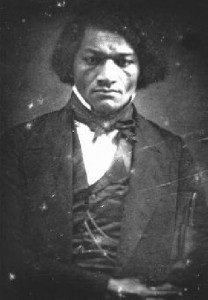Here are two contrary perspectives stated with clarity. Side A was presented yesterday by Rep. Emmanuel Cleaver, D-Missouri, in an interview with The Hill discussing the tactics of Black Lives Matter protesters:
“I don’t think that it’s acceptable, nor do I think that it’s beneficial for African-Americans — or anyone else for that matter — to develop as a tactic the acts of verbal incivility that I saw,” Cleaver said by phone, referring to the Sanders incident in Seattle. “Being civil is far more powerful than being right. What we as African-Americans must keep in mind is we did not achieve the progress that’s so visible around the world from tactics of disrespect and nastiness.”
Cleaver was quick to praise the underlying message and goals of the Black Lives Matter movement — “Progress always sits on the backs of those who refuse to accept things as they are,” he said — but countered that the more effective strategy would be to follow the less-confrontational examples of Martin Luther King, Jr., Nelson Mandela and Jesus.
“You can get your message out without shouting people down on stage,” he said. “We ought to be civil whenever possible, and frankly it’s always possible.”
Here is Side B, from Frederick Douglass, a member of the original BLM crew, speaking 163 years ago:
At a time like this, scorching irony, not convincing argument, is needed. O! had I the ability, and could I reach the nation’s ear, I would, to-day, pour out a fiery stream of biting ridicule, blasting reproach, withering sarcasm, and stern rebuke. For it is not light that is needed, but fire; it is not the gentle shower, but thunder. We need the storm, the whirlwind, and the earthquake. The feeling of the nation must be quickened; the conscience of the nation must be roused; the propriety of the nation must be startled; the hypocrisy of the nation must be exposed; and its crimes against God and man must be proclaimed and denounced.
No disrespect intended to Rep. Cleaver, but I’m going to have to side with Douglass on this one because, well, disagreeing with Frederick Douglass is almost always a really, really bad idea.
I’m also going to assume, out of respect for Cleaver, that The Hill’s reporter did him a disservice by paraphrasing part of his comments this way: “the more effective strategy would be to follow the less-confrontational examples of Martin Luther King, Jr., Nelson Mandela and Jesus.” Because that’s a hilariously self-refuting selection of “less-confrontational examples.”
 King, Mandela and Jesus were confrontational — so much so that all of them have become icons of confrontation. All three of them had a long rap sheet consisting entirely of “crimes” of confrontation. All three of them faced perpetual death threats from those they confronted. The FBI tried to blackmail King into suicide and he was gunned down before he turned 40. Mandela was sentenced to life in prison, spending 27 years behind bars for the crimes of “incitement” and sabotage. And Jesus, you may recall, was flayed and crucified by the Empire.
King, Mandela and Jesus were confrontational — so much so that all of them have become icons of confrontation. All three of them had a long rap sheet consisting entirely of “crimes” of confrontation. All three of them faced perpetual death threats from those they confronted. The FBI tried to blackmail King into suicide and he was gunned down before he turned 40. Mandela was sentenced to life in prison, spending 27 years behind bars for the crimes of “incitement” and sabotage. And Jesus, you may recall, was flayed and crucified by the Empire.
Those three are remembered and revered not because they were “less-confrontational,” but because they managed to confront, relentlessly, while retaining a startling, grace-full capacity to love those they were confronting. That love sometimes expressed itself in civil ways, but it was, more often, determinedly unconstrained by the pieties and proprieties of “civility.”
To represent King, Mandela and Jesus as exemplars of civility is to misrepresent them. To reduce love to civility is a vicious, uncivil falsehood.
Any discussion of the “civility” of the confrontational tactics of King, Mandela and Jesus is also woefully beside the point. This is a central theme of that holy scripture from Douglass quoted above. The only matter of civility worth discussing, Douglass said, was the glaring, monumental, all-consuming fact of the incivility of slavery.
Was Martin Luther King Jr. impeccably civil? Wrong question. Wickedly wrong question. Jim Crow and segregation and voter suppression were “uncivil.” Any discussion of King’s civility or incivility is a pernicious dodge in service of the effort to ignore that overwhelming fact.
Was Nelson Mandela unfailingly civil? Wrong question. Apartheid and economic oppression were uncivil. Talking about Mandela’s civility or incivility is a distraction from that that only serves to fortify the injustice he opposed.
Was Jesus civil? The short answer is No. But more importantly this is, again, the wrong question. It’s a question that leads us, inevitably, away from who Jesus was and what he said and why he said it. It’s a question that starts, and ends, with disproportionate concern for the manner of confrontation and disregard for the necessity of it.
Injustice is uncivil. Injustice conscripts civility into its own service. When that happens, “it is not light that is needed, but fire” and “the propriety of the nation must be startled.”












